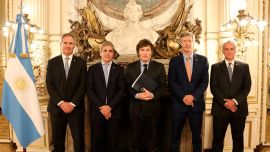In his first speech as president, Javier Milei decided to break with tradition. He spoke not in front of Argentina’s lawmakers but on the esplanade of Congress. Since then, 100 days have passed and everything has happened: there has been chainsaw plans, shock austerity and fights with governors, artists and pop stars.
La Libertad Avanza has flirted with Peronist leaders and maintained a strange closeness to Mauricio Macri and the PRO. The president’s omnibus law failed, the validity of his sweeping decree is still not assured, and a decision was made to gain time with a call for a grand ‘Pacto de Mayo.’
Karina Milei, Nicolás Posse, Santiago and Luis Caputo have accumulated more and more power while the rest of government officials, who have even witnessed dismissals on television, fumbled around. Not even Victoria Villarruel has been spared from internal attacks.
Milei and his trusted team have shown that they know one thing: how to dominate the agenda. Since December, all the talk in Argentina has been about what the president is doing, whether it’s hugging Donald Trump, talking about the spectre of communism in front of the global business elite in Davos or aggressively kissing his girlfriend Fátima Flores on stage in Mar del Plata. The common denominator is that the main channel for everything has been social media and that the modus operandi is the construction of an enemy: from the governor of Chubut Province, Ignacio ‘Nacho’ Torres, to actress and singer Lali Espósito.
There is a chronology of Milei's first 100 days in the Casa Rosada. The economist repeats that he wants to go down in history as a hero, but there is still a long way to go to find out if that is possible. Thus far, he presents his main achievements as the two consecutive months of fiscal surplus and the alleged "deceleration" of inflation that prevented a hyperinflation. According to economists who see the fine print, the surplus so far hides an adjustment that stops consumption, liquefies wages, increases tariffs and hurts retirees among other vulnerable sectors.
In addition, inflation in December was 25.5 percent, in January 20.6 percent and in February 13.2 percent. Although it has been decreasing, in all three cases it is higher than most of the high monthly figures recorded last year under Sergio Massa's economic leadership.
by Giselle Leclercq & Julián D'Imperio, Perfil


















Comments